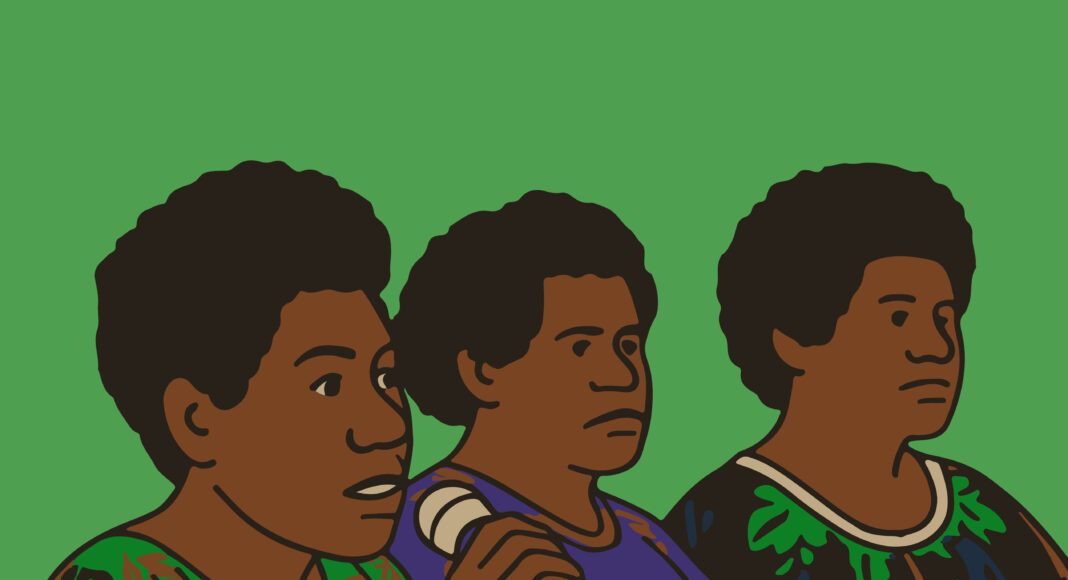From 1988 to 1998, Bougainville endured a brutal civil conflict that cost tens of thousands of lives. Yet during and after this violence, women played a central and often overlooked role in mediating tribal disputes, nurturing reconciliation, and laying the groundwork for future self-governance. Whilst peace accords and constitutions are typically high-politics, Bougainville’s path to independence, and its pursuit of a Referendum in 2019 was profoundly shaped by grassroots women-led initiatives.
Customary Power, Quiet Dissent
Bougainville’s social fabric is fundamentally matrilineal, meaning women traditionally hold authority over land and clan relationships, earning them the title, “mothers of the land” (George, 2018). However, prior to the conflict, this influence was mostly confined to familial structures. It was during the conflict’s height, characterised by blockades, loss of livelihoods, and escalating ethnic tension that women spontaneously mobilised to defend their families, organise food distribution, and convene prayer vigils as a form of survival and resistance (Anderlini, 2007).
Such quiet activism resonated deeply within the community, challenging male-dominated leadership and asserting that peace was not merely the absence of war, but a daily, communal achievement (Cockburn, 2007).
Clans, Consensus & the Road to Referendum
In the lead-up to the 2019 independence referendum, Barbara Tanne played crucial roles in conflict prevention. Tanne led dialogues across 22 clans to resolve land disputes and reduce the risk of election-related violence (Women Mediators Across the Commonwealth, 2024). The 97.7% vote in favour of independence was not only a political milestone but a testament to decades of quiet, women-led reconciliation.
Participation Beyond Symbols
Bougainville’s post-conflict governance structures and the 2004 constitution included measures to incorporate women, such as three reserved seats in Parliament and local gender quotas (George, 2018). Yet universal inclusion remains uncertain. Despite their vital grassroots roles, women remain underrepresented in national-level decision-making bodies. For example, the PNG-Bougainville Joint Supervisory Body had no women delegates from PNG (Pacific Security, 2023).
Still, women like Josephine Getsi, Theonila Matbob, and Yolande Paul have emerged as leaders, winning open seats, entering cabinet, and tilting policy debates toward gender-sensitive issues such as education, land, and environmental restoration (Matbob et al., 2021).
Reconciliation as Restoration
The concept of reconciliation in Bougainville goes beyond policy, it is a process of restoring social harmony. Groups such as the Leitana Nehan Women’s Development Agency, founded by Helen Hakena, have facilitated trauma healing, documented wartime sexual violence, and advocated for women’s land rights. They have also worked to embed women’s customary authority in official peace structures, though progress has sometimes been resisted (Cockburn, 2007).
These initiatives underline a fundamental insight, justice and recovery are preconditions for sustainable peace. They confront both public wounds and private stories, drawing on women’s custodial identity to maintain social trust (Anderlini, 2007).
Preparing for Independence: Women as Nation-Builders
Bougainville’s path to full sovereignty requires more than a referendum, it demands functional governance systems. Women’s organisations are pivotal in this transition. They engage in civic education, hold the government accountable, and ensure that emerging institutions reflect gender equity, environmental safeguards, and social justice (George, 2018).
Leaders like Matbob and Paul, both elected in 2020, exemplify this shift. As ministers of education and primary industries, they reflect the dual impact of post-conflict articulation: informal peace to public policymaking, placing women’s voices and priorities at the heart of state-building (Matbob et al., 2021).
Challenges & the Path Ahead
Bougainville remains at a turning point. Whilst women’s grassroots impact is undeniable, formal inclusion at the post-referendum negotiation table is still limited (Pacific Security, 2023). Deep-seated patriarchal notions persist both within political institutions and customary structures, often limiting women to consultative roles.
Furthermore, international attention is shifting away, as more immediate geopolitical stories, like the reopening of Panguna mine, gain prominence. But women’s peacebuilders continue to press for gender-responsive policies, accountability for violence, and authentic participation (Matbob et al., 2021).
The story of Bougainville offers a striking lesson in feminist peacebuilding, women are not auxiliary to negotiations, they are architects of peace. From mediating disputes in the bush to influencing national policy from ministerial office, their work embodies the essence of WPS, transforming conflict imperatives into social resilience and political renewal.
In the island’s journey from war to autonomy, women have carried the narrative, ensuring that reconciliation is not imposed from above, but grown from within. Their legacy is a living example that peace can flourish when nurtured by custodianship, courage, and collective care.
As Bougainville charts its future, the challenge is clear, to embed gender equality in every stage of nation-building, so that independence does more than redraw borders, it redefines power, justice, and belonging. The world would do well to watch and learn from these quiet but unstoppable architects of peace.








